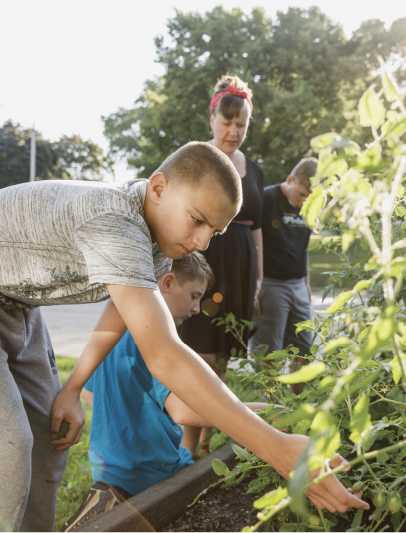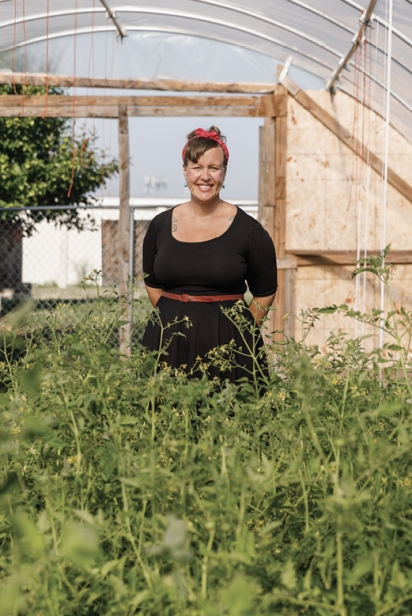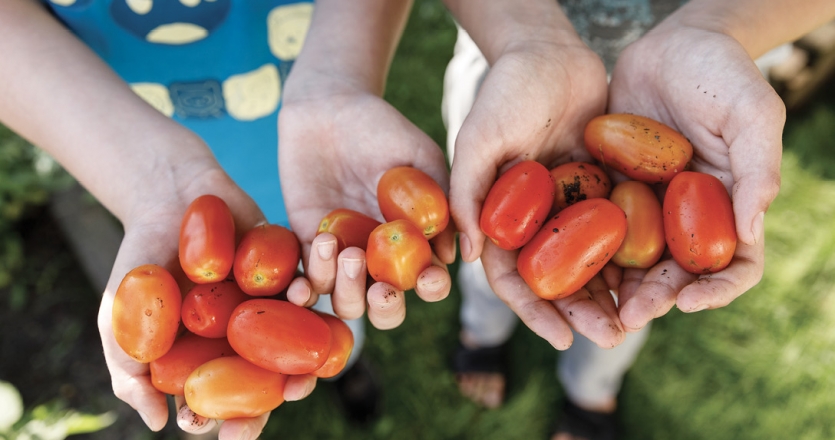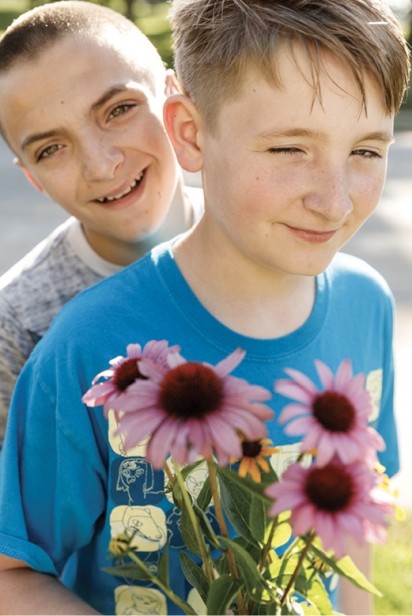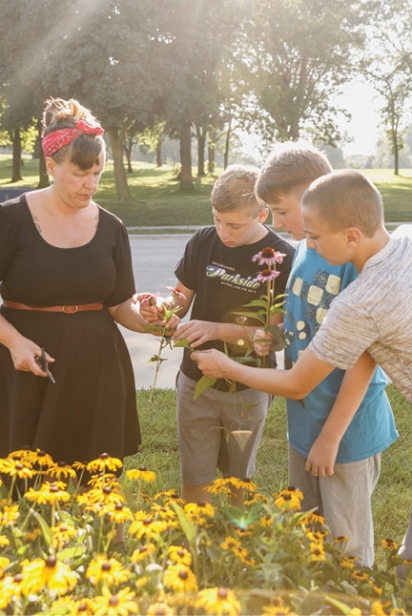A Mental Harvest: Teaching Kids to Grow Food
When you bring a child into the world, your most important job is to keep them alive. You feed them, love them, educate them; the basic needs for survival. Nourished by mother’s milk, they are loved through contact and encouragement, and are taught the essentials of life.
Our children learn to walk, to speak, to read and to write. Eventually, they are taught arithmetic, science, history and civics. As they develop and their potential expands, they learn sociology, economics, perhaps art, carpentry or even another language.
The skills children can acquire or even master at their formative ages are virtually limitless. Yet, for some reason, it is not commonplace for a child to learn how to grow food.
It seems only natural that we would pass down the fundamental tenets of how to produce, harvest and prepare the fuel we need to survive. Human beings are the only species on Earth who, by and large, are not taught these skills by their elders.
However, for a few schools in Milwaukee, grand strides are being made to impart this vital knowledge to students. Erin Dentice has been working with Parkside School for the Arts in Bay View for the last seven years; initially in a grant-writing capacity. It was one of her grants that afforded the school the opportunity to partner with Sweetwater Organics, to install an aquaponics system in one of the school’s labs. For the past three years, she has found a regular home in that very same lab, acting as the school’s contracted Aquaponics and Agriculture Program Coordinator. A program that, by the way, would not exist had she not created it.
Dentice, or “Ms. Erin,” as she’s known to her students, is more of a gardening-enthusiast than a master gardener. And more of a, “Pretty good cook,” (her words) than a professional chef. But what she may lack in gastronomical or horticultural chops, she makes up for with a confluence of organizational skills, a drive to get things done and a passion to, “Change the way we look at food.”
On a steamy Saturday morning in late July, I packed up my car with my standard outdoor cooking demo kit and headed to a Farmers Market next to the Community Gardens at 6th and Howard in Bay View. The market kicked off in May and was launched and coordinated by—you guessed it—Erin Dentice. To bolster attendance and engage market-goers, Erin put out a public call to chefs who might be interested in demonstrating vegetable-forward, multicultural dishes for market patrons to taste and hopefully recreate in their own homes. I answered the call and assembled the ingredients for Salmon Vera Cruz, a staple in my personal culinary canon.
Salmon Vera Cruz is an ideal summer dish that features salmon stewed with tomatoes, bell peppers and tarragon in a light garlic broth. It was an opportunity to highlight many of the produce items on offer this time of year at markets around the city. As I organized my booth and made my final preparations, I heard a child’s voice say, “I think there’s something fishy going on over here.”
That child was 12-year-old Gabe Winkler. Gabe is one of three triplets, and brothers Max and Ethan sidled up on either side of him followed by Mom, Becky Winkler, drawing in the reins. Gabe and Ethan are both on the autism spectrum; all three are seventh graders at Parkside School of the Arts.
Before I could gather my thoughts enough to introduce my demonstration, the three brothers began bombarding me with all the questions I was preparing to answer. “What’s that?” “What are you going to cook?”
I introduced myself to the boys and the assembled crowd of ten or so onlookers and began preparing the dish. The Winkler boys, or “Winklets” as they are sometimes called, were transfixed. Every ingredient I added, every step in the process, they were asking questions and cracking jokes. And when it came time to taste the dish, they couldn’t get enough of it. Max and Gabe both came back for seconds. Gabe assured me, “You did a really good job!”
Since fifth grade, the Winklets have been in Ms. Erin’s program, learning about vegetables, canning and even developing menu concepts for food trucks using produce grown at the school. On the day I met them, they were excited to see the full circle of how the food we grow becomes the food we eat. The peppers and tomatoes I had incorporated into my dish were the very same they had grown.
“You got them to try salmon! I never would’ve gotten them to eat that,” Mrs. Winkler told me later. Gabe chimed in, “I would if you made it like him!” Of course, I shared the recipe. Getting kids excited about vegetables can be a tall order. The practical application of school gardens and the role it plays in exposing kids to foods that would otherwise be foreign to them, is the area in which Ms. Erin sees the Agricultural Program making its biggest impact. But a program like this is not an easy thing to get off the ground.
The effort began in the form of community listening sessions three years ago, through a partnership Ms. Erin made with the Medical College of Wisconsin. “I wanted to ask, ‘How do I make this stick?’” she told me. “I don’t want (kids) to learn how great vegetables are for them and then go home and eat Flaming Hot Cheetos.”
Ms. Erin presented the idea of students growing and cooking with food. She invited stakeholders, parents and teachers. What they gleaned from the sessions was that parents needed to be heavily involved in the program as well. After all, what good are the lessons you learn if you don’t have the opportunity to apply them? So, they started evening cooking classes with families so moms and dads could mirror the lessons the kids were learning in school and continue emphasizing those skills at home.
Another connection made through the listening sessions was when someone with the City of Milwaukee’s Environmental Sustainability office alerted Ms. Erin to the vacant hoop houses located on 6th and Norwich. Ms. Erin wrote a proposal that outlined the program she envisioned, and was put in touch with the landowner. They worked out an arrangement for the school to use the hoop houses for the Agricultural Program. “They were in disrepair: the plastic was ripping off them. So the agreement was that we would fix them up.”
Ms. Erin enlisted the help of the Service-Learning students from Bay View High School, as well as families to help her complete the project. Bay View High donated materials for the project, and Ms. Erin donned her fundraising and grant writing cap once again to buy the big-ticket items, such as the thick plastic that goes over the top, as well as a tiller. She also enlisted the expertise of a farmer who understood how to reinforce the hoop houses and ensure they were well-braced and could withstand the brutal Wisconsin winters.
Ms. Erin’s background may not have been tailor-made for that of an Agriculture Program Coordinator, but it was absolutely perfect for the role of task master and ‘person-who-gets-things-done.’ She spent her former life as a project manager in finance, coordinating and overseeing the back-office aspects of mutual funds management. And while she was good at it, life in that world became joyless.
Once she became pregnant, she left that job to stay at home. To keep money flowing into the household, she started an in-home daycare center. There are tremendous liabilities and protections one must consider when assuming the responsibility to care for other peoples’ children. In assessing the safety of her home, she became aware of all sorts of environmental factors that she had never really thought about before, such as the chemicals used to treat their lawn. It was this realization that opened Ms. Erin’s eyes to the daily dangers consumed by children in the air, water and food surrounding them.
It was a foregone conclusion that Ms. Erin would apply this newly attained knowledge in a way that would aid, educate and impact as many people as possible. Not the least of which was in the ways she has enlisted the help and expertise of farmers and chefs to bring serious credibility to her program.
Ms. Erin is a contracted employee who works in six-month terms. But this is far from an ancillary program or throw-away elective. The teachers at Parkside look for all sorts of opportunities to incorporate food or agricultural components into a myriad of lessons. For example, first and second graders prepare pasta sauce made with tomatoes from the school gardens, which is a nice feel-good story and makes for a pretty picture in the local paper. But it goes well beyond that. The students began learning the life cycle of the tomato plant for science class. They investigated their own food traditions and how the tomatoes could potentially apply for their social studies class. They taste-tested the sauce as inspiration for a list of adjectives to describe the sauce for their English, language and literature classes. And of course, they created nutrition labels for the sauce for math class.
It’s no wonder there is tremendous buy-in and support from teachers and administration for this program. Parkside represents 90% of Milwaukee zip codes, rather than only being comprised of Bay View based families. That said, there are no plans currently to replicate this program in other schools, but there should be. “Programs like these are very important,” said Mrs. Winkler, a Special Ed teacher in her own right, adding, “If kids with special needs struggle with reading or writing, they need assistance in other classes with their peers. These programs level the playing field because they are inclusive and enable kids with special needs to do all the same things their peers can do. Kids that struggle in other areas excel in this program.”
“Any time you get kids involved in taking care of another living thing, it’s a good idea,” Mrs. Winkler continued, “We talk about wanting our kids to eat healthier but it’s not going to happen by putting fruits and vegetables in vending machines. As a mom of picky eaters, I find that I don’t venture out and try new things either, so I think it’s important that these programs get them invested and engaged in the whole process.”
The issue of how to present vegetables to kids is one that Ms. Erin is keenly aware of. In one unit, students had to prepare a “Parts of the Plant,” salad, incorporating various classifications of vegetables, such as carrots (roots), lettuce (leaf) and snap peas (seed vegetable). They then dressed the salad with a homemade buttermilk ranch dressing. One boy was emphatic that he would not eat the salad. After encouraging him a bit, the boy gave in and tried the snap peas. He ate all the snap peas in the salad and asked for more. Later, the student told Ms. Erin that he didn’t want to eat the peas because it was what came in the school lunch cold pack, which he had routinely thrown away.
Erin Dentice has no plans to slow down. Knowing that funding is the biggest threat to the continuation of her program, she is constantly fundraising and writing grants so that the only thing the school must pay for is her salary. I asked what connection there is between her program and the actual school lunch. “That’s tough,” she said. “I’m looking into grants to get salad bars into the school.” If Erin’s history of getting things done is any indication, I think you can expect to see a salad bar at Parkside sometime soon.
Milwaukee Parkside School for the Arts
2969 South Howell Avenue
Milwaukee, WI 53207


